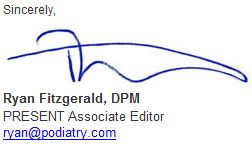DFCON 2009:
Raising the Threat Level on Diabetes
Last week, nearly 1000 podiatrists, vascular surgeons, diabetologists, and wound care specialists from over 50 nations and all 50 U.S states came together in Los Angeles, California to participate in the 6th annual Diabetic Foot Global Conference. In addition to the international health care community in attendance, the conference was also streamed live over the Internet to Australia for online conference attendees in that country to participate.
 |
Edward James Olmos presented his
Award
For Advocacy in Amputation Prevention |
For three days, participants had the great opportunity to hear clinicians, scientists, advocates, industry leaders and analysts lecture on the most recent and emerging trends in the diagnosis and treatment of the diabetic foot.
Among the topics presented, much emphasis was given toward the success of an increasing number of interdisciplinary diabetic limb salvage units around the world. As Dr. Jan Apelqvist, renowned diabetes researcher and clinician, noted: “Diabetes is a multi-system disease. The presence of a diabetic foot ulcer is a sign of multi-organ disease.” Clearly, Dr. Gerry Rayman presented the data from his center in Ipswich, UK, where amputation rates were decreased by 73% following the initiation of streamlined, interdisciplinary pathways that were patient-centered and provided for rapid diagnosis and treatment. Dr. Andrew Boulton presented similar data from his unit in Manchester, UK, where they have “reduced amputation rates trough interdisciplinary team dynamic.”
|
Peter R. Cavanagh, PHD, DSC is the
2009 Edward James Olmos Award Honoree |
In the audience, surrounded by specialists from all over the world united by an interest in the diabetic foot, it was easy to grasp the importance of reducing the real and perceived boundaries that exist in medicine today.
Dr. Mills, a vascular surgeon from the University of Arizona and Co-founder of the
Southern Arizona Limb Salvage Alliance, noted,
“All too often, clinicians find themselves trapped within “glass silos” of their specialty, within their institutions, and therefore, do not effectively integrate with members of other specialties.” This limited interaction and collaboration between specialties increases cost, and ultimately reduces the efficiency and quality of patient care.
Dr. Harkless, well-known advocate of the diabetic foot and founding Dean of
Western University's College of Podiatric Medicine, described his attempts to reduce these barriers, stating,
“What is required is a fundamental culture change, which we have initiated at Western University. We have developed a culture of clinical integration. It starts at the graduate school level and then extends throughout residency training and into practice as physicians develop.”
In addition to attempts to change the culture of medicine to promote increased interdisciplinary management of the systemic disease of diabetes, other sessions in the conference dealt with emerging technological and surgical advances which are on the forefront of providing clinicians increased success in the management of the management of the diabetic foot.
As a resident on the cusp of transition between my residency training and immersion in the “real” world of clinical practice, the opportunity to attend such a conference was a truly rewarding experience. In addition to the many great lectures that were presented by leaders of the various specialties represented, the opportunity to interact with many members of various specialties from around the world, united by a singular passion, was truly astounding. Every 30 seconds, somewhere in the world, a limb is lost as a consequence of diabetes1, but I now know that there are specialists on every continent who are waging a battle against the disease, and with advances in our communal knowledge and technical expertise, we are saving limbs, and saving lives.
As you go about your daily routines, staffing clinics, covering cases, I encourage each of you to break free from the “glass silo” which may surround you and follow Dr. Harkless’ advice: Adapt a culture change in your institution. Interact fully with your colleagues’ from the various medical and surgical specialties –avail yourself to the lessons they can teach you (and teach a few lessons yourself!)
As always, we love hearing from YOU. Please contact us, with any questions or to share your experiences with the community on this topic. I look forward to hearing from you!
